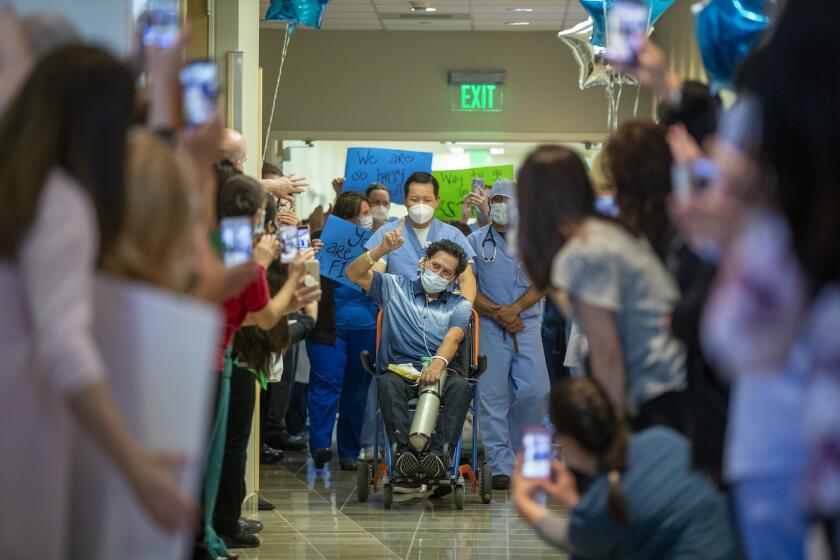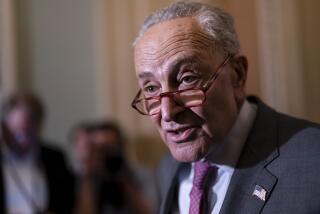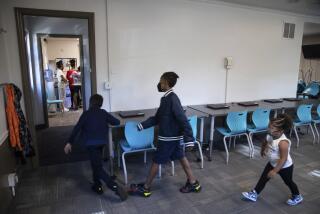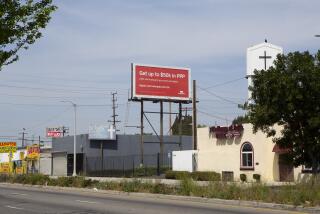Senate deadlocks on latest coronavirus relief package for small businesses
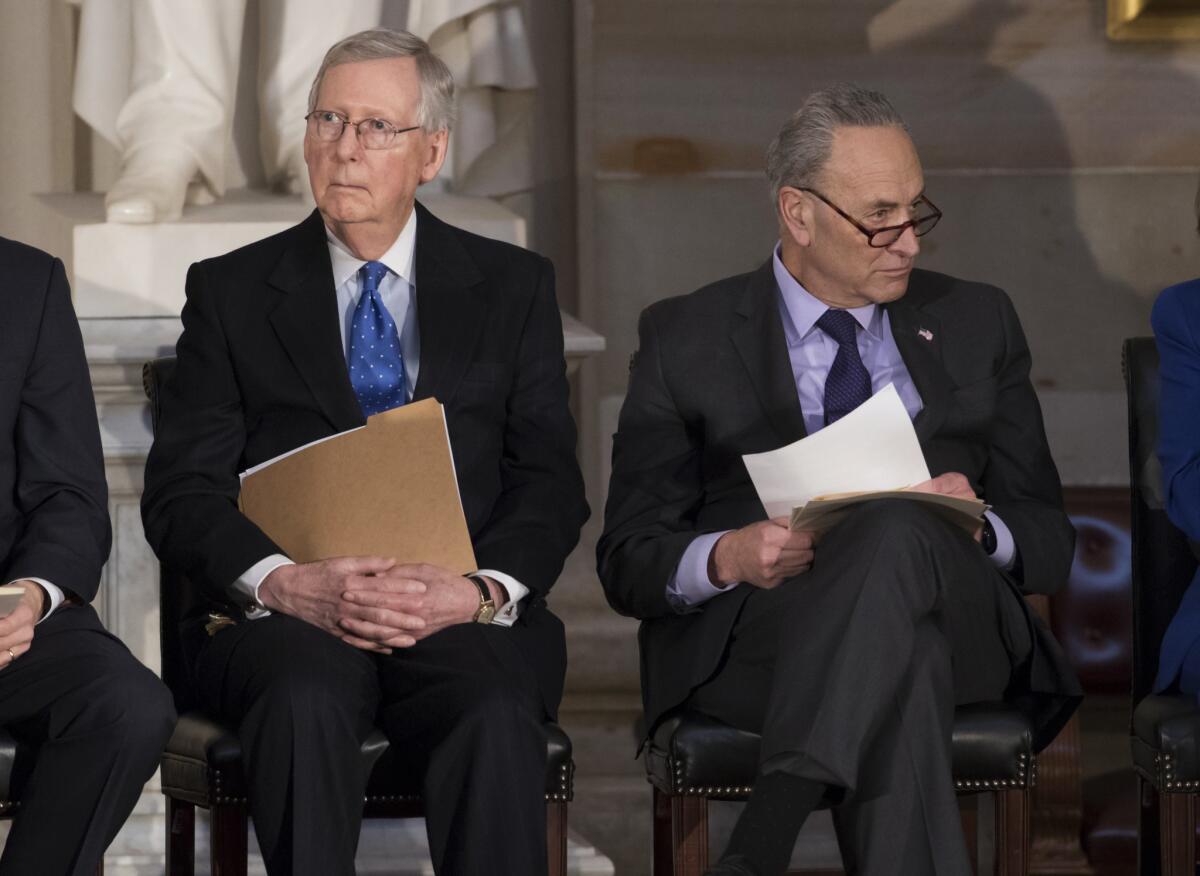
- Share via
WASHINGTON — Senate Democrats on Thursday blocked a Republican effort to add $250 billion to an overwhelmed small business loan program, the latest political standoff in the weeks-long effort to pump trillions of federal dollars to businesses and families dealing with the fallout of the coronavirus pandemic.
Senate Majority Leader Mitch McConnell (R-Ky.) tried to approve $250 billion in new funding for the Paycheck Protection Program during a brief Senate session through a fast-track method that requires no objection from senators.
There is widespread, bipartisan support to add money to the small business program. But Democrats say they won’t agree to the new spending unless there are safeguards to ensure all businesses can access the capital, including directing some of the money to small banks. They also wanted to add $100 billion for the healthcare system, and $150 billion for state and local governments.
Congress already approved $350 billion for the paycheck program — money that Republicans say is quickly running out as small businesses have flooded local banks to apply. Earlier this week, Treasury Secretary Steven T. Mnuchin requested that congressional leaders approve the additional funding.
Democrats objected to the resulting legislation proposed by McConnell, and McConnell objected to the Democrats’ counterproposal, leading to the current stalemate.
McConnell accused Democrats of holding Americans’ paychecks “hostage.”
“Do not block emergency aid you do not oppose just because you want something more,” he said to Democrats, adding that there was “no chance” the Democrats’ plan would pass the Senate quickly.
These are some of the unusual new scenes across the Southland during the coronavirus outbreak.
Sen. Ben Cardin (D-Md.), the top Democrat on the Senate committee overseeing small business, called McConnell’s proposal “a political stunt because it will not address the immediate need of small business.”
Both parties agree that the program is extremely popular, but there is disagreement on how soon it may run out of cash. Sen. Marco Rubio (R-Fla.), chairman of the Senate small business committee, says $3.5 billion is being approved each hour. “We have days, not weeks, until [Paycheck Protection Program] runs out of money,” he said.
House Speaker Nancy Pelosi (D-California) said the program still had about two-thirds of its cash available. In a call with reporters Thursday, she scoffed at the idea that Mnuchin demanded “a quarter of a trillion dollars in 48 hours with no data” to back it up.
Democrats say the small business program is structured on a first-come, first-served basis that benefits small businesses with existing relationships with their banks. Very small businesses have been unable to access it, they say.
“Many unbanked people [or those] who are under-banked are unserved on that basis,” Pelosi said in an NPR interview Wednesday. “For the next $250 [billion], we really need to have a percentage of that, $60 billion, that would go to something called community development financial institutions and that includes a number of things that they would open the way for others to participate.”
Mnuchin, in a CNBC interview, said President Trump is willing to address some of Democrats’ concerns in the next bill.
“We need more money for small business, and the president has been very clear he’s happy to talk about other issues, such as hospitals and states in the next bill,” he said. “We wanted to go to get money for the small business program,” which has “enormous bipartisan support.”
McConnell said he is open to doing more to respond to the coronavirus crisis, but he emphasized that the need for more funding for the Paycheck Protection Program was urgent. “There is no reason why this bipartisan job-saving program should be held hostage for other priorities,” he said in a statement.
The standoff — between Republicans who want to respond to the crisis in a piecemeal fashion and Democrats who want more comprehensive bills — is a glimpse of the ongoing debate over how to respond to the coronavirus pandemic and its economic fallout.
Democrats in both the House and Senate are preparing their ideas for what would be included in the next major piece of legislation, known as phase four. But Republicans are more skeptical about immediately moving to a new bill, arguing that the other three bills — including $2 trillion in the third bill alone — need time to pump through the economy.
Thursday’s Senate session is expected to be short and include only a handful of senators. Most lawmakers are back in their home states during a scheduled recess for Easter and Passover.
Nearly a week after the small business program officially opened, it continues to frustrate small business owners. Though most businesses and nonprofits with fewer than 500 employees are eligible for forgivable loans, finding a bank willing or able to lend them money has, in some cases, been extremely difficult.
Some banks have erected barriers, prioritizing their largest or existing customers. Others report that they are overwhelmed, flooded with applications at the same time that they’ve been delayed by difficulty accessing the Small Business Administration’s online application system.
Business owners fear the program will run out of funding before their loans are approved. Freelancers and independent contractors, who will be allowed to apply to the program beginning April 10, fear the money will be gone by the time they’re eligible.
In the meantime, rent, mortgage and utility bills continue to pile up.
“As we’re looking at the Paycheck Protection Program, the relief it provides appears to be getting smaller as our needs continue to worsen,” said Sean Kennedy, executive vice president of public affairs at the National Restaurant Assn. “If there isn’t strong action from Congress, you’re going to see a lot of restaurants close their doors and never reopen.”
Times staff writer Anna M. Phillips contributed to this report.
More to Read
Get the L.A. Times Politics newsletter
Deeply reported insights into legislation, politics and policy from Sacramento, Washington and beyond. In your inbox twice per week.
You may occasionally receive promotional content from the Los Angeles Times.
